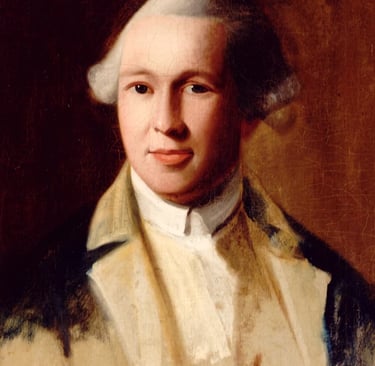Underappreciated Heroes of the Revolution #2 - "Martyr of the Revolution"
This is Post #2 in my series on lesser-known heroes of the Revolutionary War period. Today will focus on just one person - Dr. Joseph Warren (spymaster, Boston revolutionary leader, the man whose actions set Lexington and Concord into motion . . . and probably the first American martyr of the war)
Jay LeBlanc
11/18/20254 min read
Here is another underappreciated Revolutionary War "hero" I got introduced initially watching his depiction in Disney's 1957 movie version of "Johnny Tremain" movie (as I noted in my previous post on James Otis, I think I saw that movie for the first time in late elementary school, so early to mid '70s). Unlike Otis (who was a minor part of the overall story, mostly near the end), Dr. Warren was a prominent character but not initially for his revolutionary activities. I don't want to spoil the movie version for anyone, but it changes Esther Forbes' book version in many ways (particularly the stereotypical "happy ending" where none of the main characters die).
One thing the movie does do a good job of depicting is the role
of Dr. Warren within the revolutionary leadership and community. In
his role as a doctor he has the ability to travel freely in and out of
Boston (much more easily than most people could during the period
in 1774 and early 1775 after the Boston Tea Party) and observe British
troop movements. Even as a relatively young man (at the time of
Lexington and Concord he is 33, working alongside much older men on
the Boston Committee of Safety) he is selected to take on a
leadership role in part as a moderating influence between older
conservative men like Samuel Cooper and firebrands like Samuel Adams.
As I got older and really began to read more history, I learned more
about two other important events Dr. Warren was involved in. First,
while the Johnny Tremain movie suggests that Dr. Warren was part
of a committee decision to prepare for conflict, it is pretty clear that
he was the one who set the whole Paul Revere legend into motion.
He was the one who sent multiple messengers to Concord via
different routes, both to warn the militia about the British mission to
seize arms in Concord AND to warn Sam Adams and John Hancock about
the British moves (though it is not clear that they were targets themselves of the British). Once that was
complete, though, Dr. Warren switches back to his main calling to treat the wounded after the "battles."
Ironically, the place most people might have ever heard about Dr. Joseph Warren (though they probably didn't remember the name) is this painting shown above by American Revolutionary War artist John Trumbull entitled "The Death of General Warren at the Battle of Bunker's Hill, June 17, 1775" - one copy is in Museum of Fine Arts in Boston, while another larger one is hung in the Wadsworth Atheneum in Hartford, Connecticut. It depicts (in an obviously romanticized death scene) the end of the famous battle outside Boston, won by the British at a very heavy cost. In most history books, though, that battle doesn't really focus on people - if anything, it is usually depicted as a ragtag mob of colonial minutemen trying to organize themselves while waiting for George Washington to arrive and "save the day". (Spoiler alert - Washington wasn't there! He received his commission as the new army commander in Philadelphia on June 19th, 2 days after the battle took place though it would be weeks before anyone heard the news).
Officially, Joseph Warren was appointed as Major General of Massachusetts volunteers before the Battle of Bunker Hill, but when he was asked to take command on the battlefield he declined (probably realizing he had much less battlefield experience than others. Instead, he volunteered to serve under Colonel William Prescott in the defense of the redoubt which the colonists had constructed on top of Breed's Hill. As the story goes, the defenders of Breeds Hill fought off two British charges up the hill, but ran out of ammunition during the third charge; Warren was shot during that final defense (though not in the romantic way depicted above, but instead by a musket ball to the face).
One last thing to mention on Joseph Warren. While history will remember Joseph Warren as a spymaster, colonial leader, and military martyr, I think it is interesting that all of his contemporaries remembered him first and foremost as a doctor - inoculating people against smallpox, treating the wounded after the Boston Massacre, and the many people he made connections with during his relatively short medical career.
Dr. Joseph Warren Education Resources:
"This Forgotten Founding Father Hoped to ‘Die Up to My Knees in Blood’ in the Fight for American Independence. He Got His Wish", Smithsonian Magazine, Jun 2025, https://www.smithsonianmag.com/history/this-forgotten-founding-father-hoped-to-die-up-to-my-knees-in-blood-in-the-fight-for-american-independence-he-got-his-wish-180986795/
LESSON PLAN - "Johnny Tremain and the Members of the Long Room Club", Massachusetts Historical Society, 2012, https://www.masshist.org/education/johnny-tremain-and-members-long-room-club (overview), https://www.masshist.org/2012/juniper/assets/ed-curricula/blackington_complete.pdf (full lesson plan), OR https://www.masshist.org/2012/juniper/assets/ed-curricula/blackington_joseph_warren_documents.pdf (just the bio/quotes on Joseph Warren)
"Doctor Joseph Warren", National Park Service - Boston National Historic Park, Jun 2025, https://www.nps.gov/people/dr-joseph-warren.htm
"Dr. Joseph Warren: leader in medicine, politics, and revolution", The National Institute of Health's National Library of Medicine, 2020, https://pmc.ncbi.nlm.nih.gov/articles/PMC2626357/
VIDEO - "Founding Martyr: The Life and Death of Joseph Warren, the American Revolution’s Lost Hero" (presented by author Christian Di Spigna), American Revolution Institute, Apr 2022, https://www.americanrevolutioninstitute.org/video/founding-martyr-the-life-and-death-of-joseph-warren-the-american-revolutions-lost-hero/




